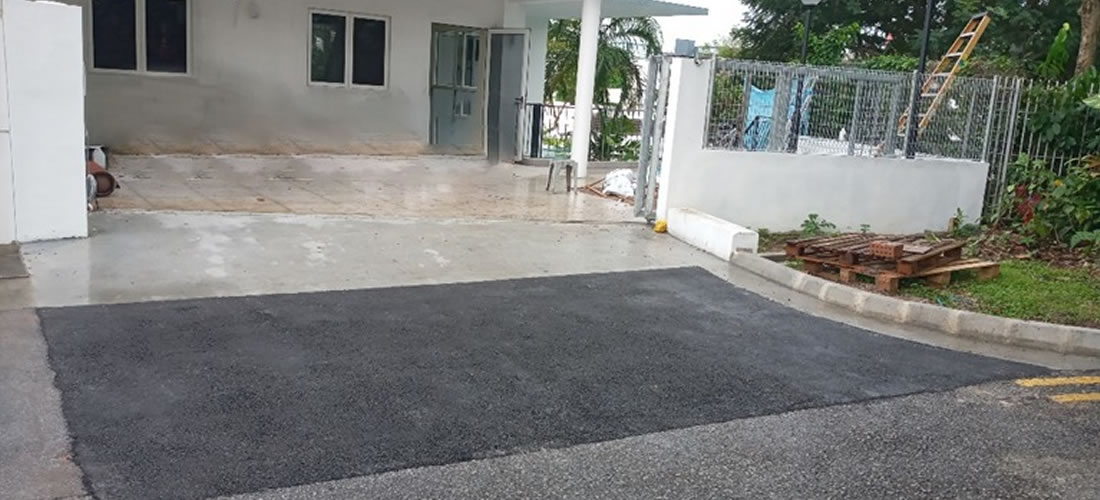
Asphalt driveways are a common sight on residential and commercial properties. These versatile and durable surfaces offer a convenient and attractive solution for vehicles to access buildings and homes. However, like any surface exposed to the elements, asphalt driveways will eventually show signs of wear and tear.
Damage can occur for various reasons, from cracking and potholes to fading and erosion. As such, it’s essential to know when it’s time to take action and whether to patch, repair, or replace your driveway.
In this blog post, we’ll discuss the options available to you and help you decide the best course of action. Understanding when to patch, repair or replace your asphalt driveway is crucial for maintaining the safety and appearance of your property and saving you time and money in the long run.
Signs of Damage
Identifying signs of damage on an asphalt driveway is the first step in determining whether to patch, repair, or replace it. Some common symptoms of damage include:
- Visible cracks
- Potholes
- Fading
Many factors, such as temperature changes, heavy vehicle traffic, or poor installation, can cause cracks in the asphalt. Potholes are another sign of damage and are typically caused by water penetrating the asphalt and weakening the sub-base underneath. Fading is another issue that can affect the appearance of an asphalt driveway, and it’s usually caused by exposure to the sun’s UV rays.
Identifying the type and severity of damage is essential to determine the best course of action. For instance, patching or resurfacing can address minor cracks and fade. At the same time, severe damage may require a complete replacement.
Patching vs Repairing vs Replacing
Once you have identified the type and severity of damage to your asphalt driveway, you can decide whether to patch, repair, or replace it. Patching involves filling small cracks and holes with a specialized asphalt patching material. Repairing usually involves removing the damaged area and applying a new asphalt layer to that specific section. Replacing, on the other hand, involves removing the entire driveway and starting a new.
Each option has advantages and disadvantages, depending on the type and severity of the damage. For example:
- Patching is ideal for minor cracks and surface damage, and it’s a quick and inexpensive solution that can prolong the driveway’s life for a few years.
- Repairing is ideal for more extensive damage, such as deep potholes, and it can help restore the driveway’s structural integrity. However, it can be more costly and time-consuming than patching.
- Replacing is usually the last resort and is necessary for severe damage or when the driveway has reached the end of its lifespan. It’s a more expensive and time-consuming option, but it ensures a new, durable driveway that can last for decades.
In the following sections, we’ll discuss each option in more detail and help you determine which is right for your driveway.
Factors to Consider
Several factors should be considered when deciding whether to patch, repair or replace an asphalt driveway. One of the most important factors is the cost of each option. Patching and repairing are generally less expensive than replacing the entire driveway. However, the cost will vary depending on the damage’s extent and the driveway’s size. Another factor to consider is the age of the driveway.
If the driveway is nearing the end of its expected lifespan, it may be more cost-effective to replace it rather than continuing to patch or repair it. Additionally, the extent of the damage should also be considered.
If the damage is extensive, patching or repairing may not be sufficient. A full replacement may be necessary to ensure the driveway’s safety and longevity. By considering these factors, you can decide which option is best for your asphalt driveway.
Conclusion
In conclusion, this blog post has highlighted the main points to consider when deciding whether to patch, repair, or replace an asphalt driveway. It’s essential to assess the damage’s severity, the driveway’s age, and budget constraints. For minor damage, patching may be a suitable option. Repair or replacement may be necessary for more severe damage or an ageing driveway.
Our final recommendation is to seek professional advice from a Asphalt Paving Contractor before making a decision. A professional can evaluate the extent of damage and provide the best solution for your situation. By seeking expert advice, you can ensure the longevity and safety of your asphalt driveway.

